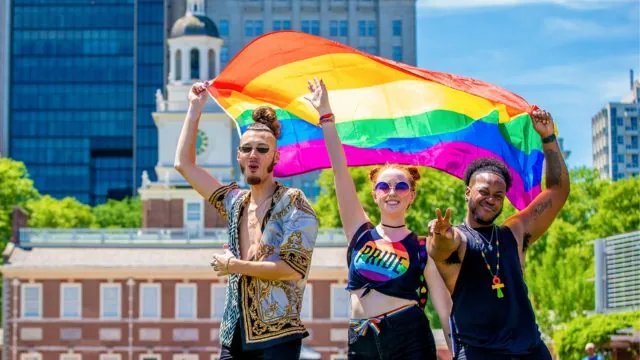Illinois stands out as one of the most progressive and inclusive states in the United States concerning LGBTQ rights and acceptance. With a rich history of championing LGBTQ equality, from being the first state to repeal its sodomy laws in 1962 to legalizing same-sex marriage in 2013, Illinois has consistently implemented comprehensive non-discrimination protections for LGBTQ individuals across various facets of life. The state boasts a vibrant and diverse LGBTQ community supported by numerous organizations, events, and resources. In this article, we delve into why Illinois is an LGBTQ-friendly state to reside in, examining both its strengths and the challenges faced by the LGBTQ community within the state.
Legal Recognition and Protection
Illinois has been at the forefront of recognizing and safeguarding the rights of LGBTQ individuals. The state repealed its sodomy laws in 1962, marking a historic milestone as the first in the U.S. to do so. Subsequently, Illinois enacted the Illinois Human Rights Act in 2005, prohibiting discrimination based on sexual orientation and gender identity in various areas, including employment, housing, credit, and public accommodations¹. Notably, the state legalized civil unions for same-sex couples in 2011, affording them equivalent rights and benefits as married couples¹. The passage of the Religious Freedom and Marriage Fairness Act in 2013 made Illinois the 16th state to legalize same-sex marriage. In 2016, the state banned conversion therapy on minors, further protecting LGBTQ individuals. The Inclusive Curriculum Law of 2019 mandates public schools to incorporate LGBTQ contributions into history and social studies classes¹. In 2020, the Affirming and Inclusive Schools Task Force Act was passed, establishing a task force to enhance safe and supportive learning environments for LGBTQ students. Finally, in 2021, the Gender-Neutral Identification Documents Act allowed individuals to choose a non-binary gender marker on their driver’s licenses and state IDs.
These legal accomplishments have positioned Illinois among the most LGBTQ-friendly states in the nation, according to the Human Rights Campaign (HRC). The HRC’s State Equality Index, evaluating states based on LGBTQ-related laws and policies, assigned Illinois a score of 28.5 out of 30.5 in 2020, ranking it among the top 21 states plus the District of Columbia recognized for pioneering measures in advancing LGBTQ equality.
Community and Culture
Illinois boasts a vibrant and diverse LGBTQ community, with an estimated 4.5% of its 12.7 million residents identifying as LGBTQ according to a 2019 report by the Williams Institute. The state houses several LGBTQ organizations offering support, programming, and resources, including Equality Illinois, the largest LGBTQ civil rights group; the Illinois Safe Schools Alliance, advocating for LGBTQ-inclusive education; the Center on Halsted, the Midwest’s largest LGBTQ community center; and the AIDS Foundation of Chicago, providing HIV prevention, care, and advocacy services.
Numerous LGBTQ events and festivals, such as the Chicago Pride Parade and Northalsted Market Days, contribute to Illinois’s vibrant LGBTQ culture. The state’s arts and entertainment scene reflects LGBTQ inclusivity, featuring notable LGBTQ figures like Jane Addams, Barack Obama, Jennifer Hudson, and Janelle Monáe. Illinois is also home to LGBTQ-friendly venues such as Sidetrack, Berlin, Roscoe’s Tavern, and Big Chicks.
Challenges and Opportunities
Despite significant progress, Illinois faces challenges and opportunities for improvement in LGBTQ rights and acceptance. A 2019 report by the Movement Advancement Project (MAP) ranked Illinois 19th out of 50 states in terms of LGBTQ policy support, highlighting areas for enhancement, including healthcare access, protection against hate crimes, and increased support for LGBTQ youth.
Regional disparities in LGBTQ acceptance exist, with urban areas generally more LGBTQ-friendly than rural and suburban areas. A 2019 survey by the Public Religion Research Institute (PRRI) revealed differing levels of support for anti-discrimination legislation and same-sex marriage among residents based on their location.
Conclusion
Illinois emerges as a desirable state for LGBTQ individuals seeking a welcoming place to live. The state’s robust legal framework, vibrant LGBTQ community, and a history of leadership in LGBTQ advocacy contribute to its reputation as an LGBTQ-friendly state. However, areas requiring improvement include healthcare access, protection against hate crimes, and increased support for LGBTQ youth. Additionally, regional disparities suggest the need for ongoing education and outreach efforts to foster inclusivity across the entire state. In summary, while Illinois is LGBTQ-friendly, there is ongoing work to ensure that all LGBTQ individuals can live with dignity, respect, and freedom in the state.

